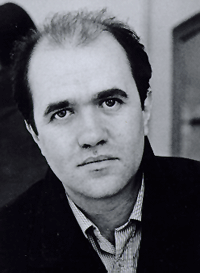
| NYWI HOME PAGE | VISITING WRITERS & EVENTS INDEX | VIDEO ARCHIVES | BLOG |
 |
NYS Writers Institute, March 28, 2001
4:00 p.m. Seminar | Humanities 354, Uptown Campus
8:00 p.m. Reading | Recital Hall, Performing Arts Center, Uptown Campus
PROFILE
Colm Tóibín, one of Ireland's leading journalists and best young writers, is the author of two critically acclaimed books published this past year, The Blackwater Lightship, a novel, and the Penguin Book of Irish Fiction, a 1000-page anthology. He has written a regular column for the Dublin Sunday Independent and has also published several travelogues including The Sign of the Cross: Travels in Catholic Europe (1994) and Homage to Barcelona (1990).
The Blackwater Lightship recounts the struggles of a young Irishman's multi-generational family has he dies from AIDS. Short-listed for the Booker Prize, the novel is notable for its restraint in the face of melodramatic subject material. Mark Levine, writing in Men's Journal says,
"Tóibín writes like a stylistic heir of Hemingway, in spare and brutally insistent prose, and inhabits a domain of silence and inarticulate hurt with utter conviction. His book is a microscopically drawn map of the ways families inflict pain on themselves. There's not a cheap revelation or a fake insight to be found on its pages. . ."
Tóibín's controversial new anthology, The Penguin Book of Irish Fiction, makes the case that most good Irish fiction is a commentary, veiled or not, on the Irish political conflict. Kirkus Reviews remarks that
"The authors Tóibín brings forth range from the canonical (Jonathan Swift) to the trendy (Roddy Doyle) to the obscure (Robert Tessel), and they all participate, willingly or not, in the argument Tóibín describes... A magisterial collection, nicely arranged and invaluable to anyone interested Irish literature."
Tóibín states in his introduction to the anthology that, "In Irish fiction there are no happy families; there is no novel which ends in a wedding. Instead, the tone is melancholy and the theme is brokenness; the stories and novels (and indeed the plays and poems) are full of angry fathers, divided families and on overwhelming sense of loss."
Earlier novels by Tóibín include The South (1990), winner of the Irish Times-Aer Lingus International Fiction Prize; The Heather Blazing (1992), short-listed for the Guidance Fiction Prize; and The Story of the Night (1997). The last tells the story of a gay man in Argentina whose repression of his sexual identity parallels a national silence about the political atrocities that occur all around him. James Simmons, writing in The Spectator, called the book "powerful," and said that
"This novel leads you through its somewhat meandering plot clearly and tactfully and interestingly, with no hint of obscurity, no bombast, no showing off. . .and yet it is original and disturbing, with a satisfying ring of imaginative truth."
Tóibín is one of the most widely read journalists in his native Ireland, best known for his regular column in the Dublin Sunday Independent. He has also written several travelogues, including The Sign of the Cross: Travels in Catholic Europe (1994), and a personal exploration of places of importance in Catholic past and present--pilgrimage sites, centers of power and embattled strongholds. The New York Times Book Review said of The Sign of the Cross
"Tóibín is an exemplary memoirist, spare and exact in his use of detail, his prose filled with wonder (or repulsion) rather than sentiment, with the past presenting itself not simply as a remembered story but as a vexing question never adequately answered."
Additional Work:






For additional information, contact the Writers Institute at 518-442-5620 or online at https://www.albany.edu/writers-inst.